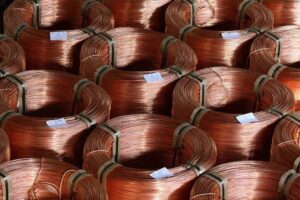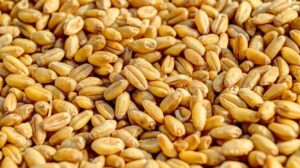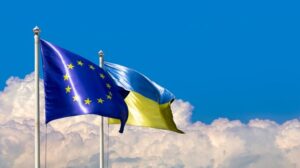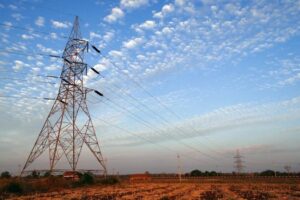
Ukrainian enterprises in January-May this year increased imports of copper and copper products in value terms by 93.2% as compared to the same period last year – up to $47.614 million.
According to customs statistics, released by the State Customs Service of Ukraine, the export of copper and copper products for the period decreased by 27.5% – to $33.701 million.
In May, imported copper worth $10.122 million and exported – $6.399 million.
As reported, Ukrainian companies in 2022, imports of copper and copper products in value terms reduced by 64.3% compared to the previous year – up to $ 65.370 million, and their exports decreased by 56.3% – to $ 90.245 million.

Ukrainian Agribusiness Club (UCAB) considers the continuation of the restrictive measures on import of wheat, corn, rapeseed and sunflower from Ukraine to Poland, Hungary, Slovakia, Romania and Bulgaria discriminatory and groundless and insists on the cancellation of this decision.
“Such prolongation will neither solve the problems of local markets nor improve the situation of local farmers,” said a statement published on the UCAB website on Monday.
The business association believes that the resolution prepared by the EU on the prohibition of the import of agricultural products from Ukraine to five neighboring EU countries, according to which the restrictions will be in force until September 15 this year, will have a negative impact on the economic recovery of Ukrainian farmers during the war.
Such decisions should be taken only after detailed studies and consultations with all EU member states because according to the latest data, some neighboring EU member states, such as Poland, were able to increase their export potential and domestic processing by importing cheaper Ukrainian agricultural products and improve their positions in livestock and finished products, the UCAB reminded.
The business association noted the negative influence of such a decision on the situation with sabotage of the “grain agreement” by Russia. “According to preliminary forecasts, the current steps to prohibit the import of Ukrainian agricultural products to the EU may deepen the blackmailing of the Russians regarding the operation of the grain corridor,” the UCAB said.
Experts of business-association emphasized that Ukraine will have less export potential in 2023 season: export of grains and oilseeds from Ukraine is forecasted to decrease by one third to 46 million tons per year.
Existing trade restrictions on Ukrainian agricultural products in five countries of the EU should be abolished. At the same time, it is worth conducting an open constructive dialogue between representatives of the Ukrainian and European agro-communities in order to find compromises, which will help both the EU and Ukraine to become stronger, summed up in UCAB.

The European Union has extended by another year the cancellation of import duties on Ukrainian exports. This decision will become effective from 6 June 2023 and will be effective until 5 June 2024, inclusive.
The regulation of the European Parliament and the European Council of May 31 on extending for another year the abolition of import duties on Ukrainian exports was published in the EU official Journal on Monday.
The moratorium on duties imposed in 2022 will expire on June 5, 2023.
In order to prevent fraud in the preferential mechanisms established by the regulation, Ukraine must comply with a number of rules, including refraining from introducing new duties or charges and new quantitative restrictions or measures with equivalent effect, from increasing existing duties and charges, and from imposing any other restrictions in trade with the EU, unless clearly justified, the document says.
According to the regulation, if Ukraine fails to comply with any of these conditions, the EU may suspend the preferential mechanisms.

The volume of electricity imports from Slovakia rose 27.3 percent on Sunday compared to Saturday to 4,427 MWh per day, according to data on the website of Continental Europe Transmission System Operators Network ENTSO-E.
According to the site, imports came in 16 hours a day from 6:00 a.m. to 10:00 p.m. at capacities of 10-350 MW. The maximum allowed cross-sectional capacity for imports in the Slovak direction is 350 MW, and on Sunday it was at that capacity for three hours. A total of 10 hours recorded capacity in excess of 300 MW.
At the same time, imports for Monday dropped almost 10 times to 476 MWh per day.
At the same time, according to ENTSO-E data, power exports to Poland, after Monday’s weekend absence, were carried out for nine night and day hours at a capacity of 200 MW – a total of 1,800 MWh per day.
For Moldova, no data on both imports and exports have been available since early June.
As previously reported, electricity supplies from Slovakia were planned at 7.1 thousand MWh per day on June 3 and 7.5 thousand MWh per day on June 4. For comparison, during the first two days of June just under 1.5 thou. MWh was received. A record number of traders participated in the auctions to allocate cross-section capacity on those days – 16 and 17 traders, respectively. Nevertheless, on Saturday, traders absorbed only half of the redeemed cross-section, supplying 3,477 MWh of electric power per day.
Vitaliy Butenko, head of the Energy Company of Ukraine (EKU), commented on the traders’ activity over the weekend: “At the weekend, prices in Slovakia are significantly lower than electricity prices in Ukraine. This trend has been observed for several weeks in a row, which makes it possible to provide additional amounts of electricity to support the Ukrainian energy system.

Ukraine in May exported about 41,000 MWh, while importing half as much – about 20,000 MWh, according to published data on the website of the continental European network of system operators ENTSO-E.
Electric power was exported to Moldova, amounting to 23.3 thousand MWh and to Poland – 17.6 thousand MWh.
In the last week of May, after the announced shutdown of some units, there were no exports except for a few hours during certain days, and the transmission system operator, NEC Ukrenergo, did not auction any capacity for exports at the end of May, except for a few hours on certain days.
Imports came from Slovakia – about 18,000 MWh and from Moldova – about 2,000 MWh (the last few days of May data for Moldova are not displayed on the ENTSO-E website – ER). At the same time, it has increased considerably since May 20, almost six times compared to the first half of the month.
At the same time, exports decreased three times compared with the first two weeks of May.
At the same time in May, due to the growing demand for exports and restrictions on their implementation, traders for the first time began to pay for exports to Moldova and Poland (along the line KAES-Zheshuv) – UAH 1.8 million and UAH 0.5 million respectively. Also 1.3 million UAH were paid for the section for imports from Slovakia on certain days.
As reported, exports of electricity, which was resumed in April after it was stopped in October, amounted to 89.7 thousand MWh for the month. Most of the electricity was exported to Moldova – over 40 thou MWh, another 30.4 thou MWh went to Poland and 19.2 thou MWh to Slovakia.
However, exports to Slovakia lasted only four days, having been suspended since April 21 at the initiative of the Slovak transmission system operator.
The section to Slovakia for 4 days brought to Ukrenergo about 17 mln hryvnia. The NERC, Ukrenergo and the Ministry of Energy are resolving the issue of resuming exports to Slovakia.
Electricity imports in April amounted to about 4 thou MWh – 3.8 thou MWh from Slovakia (a third less than in March) and 0.1 MWh from Moldova (in March there were 1,541 MWh).

Ukrainian President Volodymyr Zelenskyy believes that there is “politics” in the decisions of a number of countries that have banned imports of Ukrainian grain.
“I am grateful to my neighbors who support us, but to be honest, there is politics there. We have the Black Sea blocked and we need help with weapons. We can’t risk relations with some countries,” he said Saturday in an interview with Italian media.
“And I understand that some political currents are taking advantage of this situation and instigating farmers to block grain shipments. But they have no right to block transit,” he said.
“We will solve these issues,” Zelensky stressed.